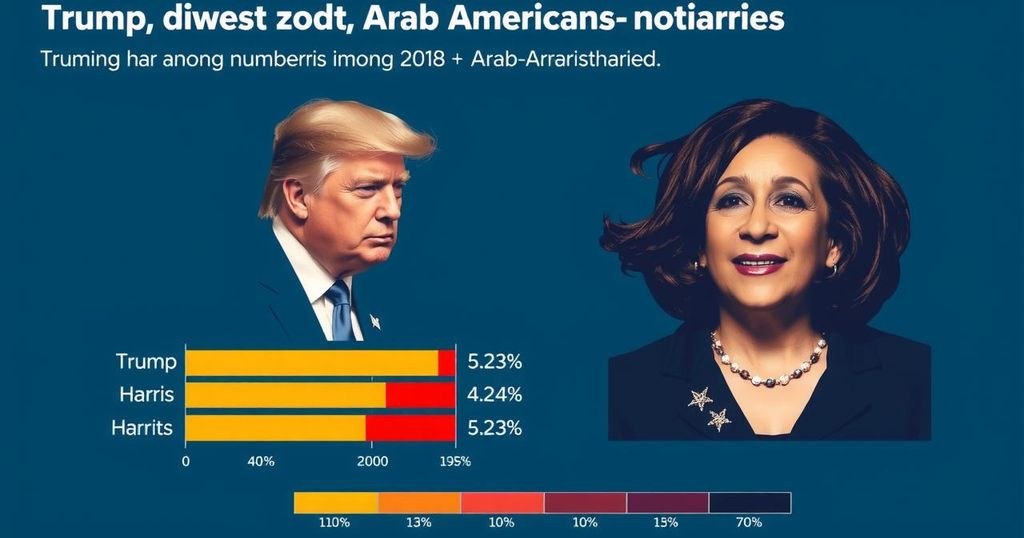Poll Indicates Trump Leads Harris Among Arab Americans Amid Gaza Conflict Concerns

A recent poll shows Donald Trump leading Kamala Harris among Arab Americans, garnering 45 percent to Harris’s 43 percent. The poll indicates that the ongoing Gaza war influences this demographic’s support, with Trump viewed as more capable of handling the Israel-Palestine conflict. The findings are concerning for Democrats as Harris’s support is significantly lower than Biden’s in 2020, particularly in swing state Michigan, where Arab Americans hold substantial voting power.
A recent poll indicates that Donald Trump is slightly ahead of Kamala Harris among Arab American voters, with Trump receiving 45 percent support compared to Harris’s 43 percent. This poll, conducted by Arab News/YouGov, reflects concerns that the ongoing war in Gaza is negatively impacting Democratic support among a crucial voting demographic. The poll results show that Trump is perceived as more capable of resolving the Israel-Palestine conflict than Harris, leading by a margin of 39 percent to 33 percent on that specific question. Furthermore, both candidates are equally regarded with 38 percent each when asked who would be better for the Middle East in general. The Arab-American community has expressed significant concern regarding the Israel-Palestine conflict, with 29 percent of respondents indicating it as their top priority, followed by economic issues and discrimination. Despite Trump’s lead, the former president is also viewed as more supportive of Israel’s current government compared to Harris by a six-point margin. With the election approaching, the findings serve as a caution for Democrats, particularly because Vice President Harris’s support among Arab Americans is markedly lower than President Biden’s was in the 2020 election, showing an 18-point decrease. The importance of the Arab-American vote is underscored by their concentration in critical swing states like Michigan, which has the highest concentration of Arab Americans in North America. Adding to the political dynamics, the mayor of Hamtramck, Michigan, which boasts an all-Muslim government, has publicly endorsed Trump, calling him a “man of principles.” Trump won Michigan in 2016 by a slim margin, and Biden’s victory in 2020 was by a mere 150,000 votes. Trump has also directed specific criticism at Harris for her associations with individuals like former Congresswoman Liz Cheney, which may be perceived unfavorably by this voter bloc. In a statement via his Truth Social platform, Trump warned, “If Kamala gets four more years, the Middle East will spend the next four decades going up in flames, and your kids will be going off to War, maybe even a Third World War, something that will never happen with President Donald J. Trump in charge.”
The significance of the Arab-American vote has been increasingly acknowledged in American electoral politics, especially in battleground states like Michigan, where they comprise a substantial portion of the electorate. The current poll results highlight shifting loyalties among Arab Americans, largely attributed to the recent geopolitical events surrounding the Israel-Palestine conflict. Historically, this demographic has leaned towards the Democratic Party, making these changes particularly alarming for Harris’s campaign. The presence of Trump, who appeals to nationalist sentiments while maintaining a strong pro-Israel stance, complicates this electoral landscape. The findings also signal a broader potential re-evaluation of political affiliations among historically Democratic voter segments, influenced by current events and candidates’ positions on foreign policy and community concerns.
The latest poll revealing Donald Trump’s narrow lead over Kamala Harris among Arab Americans serves as a critical warning for Democrats as election day approaches. Concerns over the Israel-Palestine conflict and economic issues appear to be pivotal in shaping Arab Americans’ political preferences. Trump’s perceived ability to effectively address these concerns, coupled with a decline in Harris’s support relative to Biden’s performance in 2020, may have significant implications for the upcoming presidential election, particularly in vital swing states such as Michigan. The shifting allegiances underscore the importance of addressing community-specific issues and perceptions to secure electoral victories.
Original Source: www.aljazeera.com







